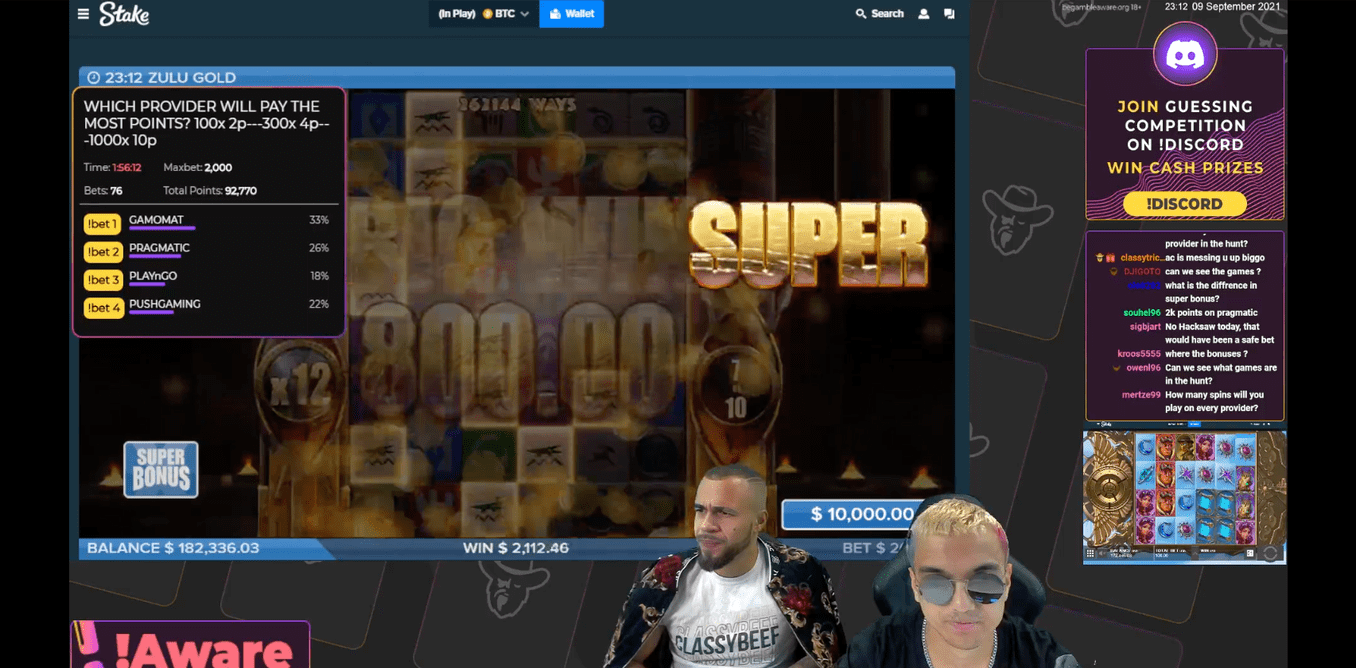Gambling live streams on Twitch: What are they and why do they matter?

ClassyBeef are casino streamers on Twitch.
(ClassyBeef/Twitch)
Streaming services such as Twitch and YouTube Live are now a significant part of popular entertainment. These sites host millions of “live streamers” and tens of millions of daily viewers.
Streamers broadcast their lives and activities — often digital gaming — to audiences who interact and chat with them in real-time. Twitch, the dominant streaming platform, also currently houses around 150 channels offering the live broadcasting of real-money slot machine gambling — the most popular of these regularly receive over 100,000 views.
Slot streaming channels have recently made headlines. Well-known streamers have been racking up views and wagering and winning large sums of money. Criticism from other streamers has flowed in, such as Imane “Pokimane” Anys calling the hosted slots sites “sketchy” and “ethically ambiguous.” And Felix “xQc” Lengyel eventually ended his slots streaming, concerned he was addicted to gambling and apologized for exposing his audience — which included underage youth — to gambling.
Age-gating and gambling
Research on Twitch is growing, particularly in relation to gambling streams. One of the first studies in this area found that approximately four per cent of adults in the United Kingdom watch gambling streams like the Twitch slot channels, compared to approximately 14 per cent who actually play such slot machine games online. This study also found a correlation between watching gambling online and self-reported problem gambling, but cause and effect remain unclear.
Live gambling streams inspire some important ethical and regulatory discussions. The media outcry over these streams often points to the risk of exposing youth to gambling. Age-gating, or age verification, on Twitch or elsewhere is minimal. A streamer can indicate that the stream is intended for mature audiences, but this does not restrict any viewer from clicking “Start Watching.”

Twitch is the dominant streaming platform when it comes to live broadcasting of real-money slot machine gambling.
(Shutterstock)
The decades-long norm of disregarding age-gating in digital games demonstrates how easy these sorts of barriers are to evade. This suggests new legal concerns for live streaming platforms that allow gambling to be broadcast.
Transparency and legal issues
A separate set of issues exist when it comes to transparency. Streamers may be committing malicious deception, or even outright fraud, if they fail to disclose affiliations with the gambling sites at which they play.
For example, some sponsorship contracts may entitle the streamer to regular balance “top ups.” This involves a gambling site providing a free (or in casino terms, “comped”) account balance refresh. This practice raises questions regarding advertising standards, as well as the safety and mental health of the streamers themselves — like xQc’s concerns over a possible gambling addiction.
In addition, the underlying gambling activity itself could be illegal depending on the license status of the gambling website and geolocation of the streamer. Yet determining what is permitted is not always a simple task.
If the gambling website is hosted in one location, the streamer in another and the viewers are located around the world, which local, national and international laws apply? Compound this with a variety of currencies — like fiat, fungible crypto, non-fungible crypto, virtual currencies without cash value — not all of which are legal tender for gambling in all jurisdictions, and the complexity of the situation becomes clear.

Streamers should be cautious of committing fraud, like failing to disclose gambling site affiliations.
(Shutterstock)
Twitch’s community guidelines are nevertheless clear that streamers must follow relevant laws, that illegal content is prohibited and that the platform will take action via suspensions or bans following investigations of reported illegal gambling.
In mid-August, Twitch announced a creator update prohibiting sharing links and referral codes to slots, roulette or dice games. The goal was “preventing harm and scams created by questionable gambling services that sponsor content on Twitch.” As a blanket prohibition, it does not discern between licensed and unlicensed gambling sites and does not include poker, another commonly streamed game.
Why do people watch live gambling streams?
With this range of issues, why do people watch live gambling streams? For people experiencing problems with their gambling, they might turn to casino streams to cope with cravings. On a recent podcast episode of All Bets Are Off, a gambling addiction recovery podcast, two men discussed using live gambling streams as part of their recovery.
Alternatively, interest in these streams may be unrelated to gambling cravings and focus on entertainment, excitement or other gambling motivations like financial interests.
Our latest ongoing research explores viewing motives using data from Twitch live chat, alongside an analysis of the characteristics of Twitch’s major slots stream videos.
LetsGiveItASpin is a popular streamer in the Slots category on Twitch and YouTube Live.
Technological innovation has always developed more quickly than government rules that govern any given space. As a result, activities like slots streaming fall into an area of uncertainty. Ultimately, it seems that consideration of consumer protection in this space cannot solely be a government-regulated effort.
Given the complexity of jurisdictional rule and the potential harm that may arise from gambling, all stakeholders — streamers, platforms, game developers, consumers themselves, parents and more — have a role to play in ensuring that games and their many means of play and broadcast are, as Twitch declares as its goal, “a friendly, positive experience for our global community.”
Broadcasting real-money gambling inevitably complicates the ethical practices of such a platform. Gambling live streams appear likely to become an increasingly important part of contemporary gambling practices in the years to come, and merit the closest study.

During the past 5 years, Brett Abarbanel has received funding from the Manitoba Gambling Research Program, GP Consulting, U.S.-Japan Business Council, Wynn Las Vegas, Victoria Responsible Gambling Foundation, Connecticut Council on Problem Gambling, Bermuda Casino Gambling Commission, the States of Nevada and California, Canadian Partnership for Responsible Gambling, GLG Consulting, MGM Resorts International, ProPress Germany. Dr. Abarbanel has received reimbursement for travel from Association Cluster Sport International, Kansspelautoriteit, Gamification Group (Finland), British Columbia Lottery Corporation, International Association of Gaming Advisors, GambleAware, Las Vegas Convention and Visitors Authority, Ultimate Media Ventures, Canadian Partnership for Responsible Gambling, IGT Latin America, University of Salford, and National Collegiate Athletic Association (USA). During the time period, Dr. Abarbanel was a member of the Singapore National Council on Problem Gambling International Advisory Panel, for which she was reimbursed for her time. She is a founding director of the Nevada Esports Alliance, for which she is not reimbursed for her time.
Luke Clark receives funding from the Natural Sciences and Engineering Research Council of Canada (Discovery Grant RGPIN-2017-04069) and is the Director of the Centre for Gambling Research at UBC, which is supported by funding from the Province of British Columbia and the British Columbia Lottery Corporation (BCLC), a Canadian Crown Corporation. The Province of BC government and the BCLC had no role in the preparation of this article and impose no constraints on publishing. In the past 5 years, LC has received speaker/travel honoraria from the National Association for Gambling Studies (Australia) and the National Center for Responsible Gaming (US), and fees for academic services from the National Center for Responsible Gaming (US), GambleAware (UK) and Gambling Research Exchange Ontario (Canada). He has not received any further direct or indirect payments from the gambling industry or groups substantially funded by gambling.
Dr. Johnson received funding (2017-2019) from Gambling Research Exchange Ontario and Alberta Health Services for an independent research project, and has received conference travel reimbursement from the Alberta Gambling Research Institute and GambleAware UK.
Dimitrios Avramidis does not work for, consult, own shares in or receive funding from any company or organisation that would benefit from this article, and has disclosed no relevant affiliations beyond their academic appointment.







